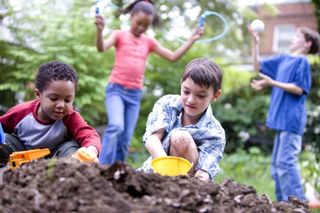Play
How Can We Restore Children’s Independent Outdoor Play?
I’m asking for your ideas about how to make real play possible for kids again.
Posted May 9, 2019 Reviewed by Devon Frye

Children are designed, by nature, to play with other children independently of adults. Generally, the best place for them to play is outdoors, partly for the fresh air, vigorous exercise, the multitude of play opportunities, and exposure to nature that the outdoors provides; but also because, traditionally, that is the best place for children to get out from under the thumbs of adults. To grow up well, children need to get away from adults and, in that way, learn how to create their own activities, solve their own problems, and get along with peers without recourse to authority figures.
Children everywhere, throughout human history until very recently, spent huge amounts of time outdoors, with peers, away from adult control, and that is how children have always learned the most important lessons that we all must learn for a satisfying life. In recent decades, however, a variety of social changes have conspired to make it almost impossible for children to go outdoors, away from interfering and controlling adults, and find other children with whom to play and explore.
We are now, sadly, witnessing the consequences of play deprivation, including huge, well-documented increased rates of depression, anxiety, and suicides among young people and well-documented declines in an internal locus of control, creative thinking, and psychological resilience. Here are some of my previous Psychology Today essays that contain evidence concerning children’s needs for free play and the consequences of play deprivation:
- The Decline of Play and Rise of Children’s Mental Disorders
- The Culture of Childhood: We’ve Almost Destroyed It
- As Children’s Freedom Has Declined, So Has Their Creativity
- Risky Play: Why Children Love It and Need It
- Free Play is Essential for Normal Emotional Development
So now the question is: What can we do to restore children’s freedom for independent play and thereby restore their mental and physical health? I have posted some thoughts on this before, and I will present some new thoughts in a subsequent post. But here, now, I am interested in your thoughts.
Please, in the comments section to this post, present your best idea or ideas about what we—as individuals or as communities—can do to bring real play (that is, freely chosen and self-directed play, independent of adults) back to children’s lives in today’s word. Perhaps you have already solved or partly solved this problem for your own children, or know of others who have. What did you or those others do? What do you see as the primary barriers to children’s free outdoor play today and how can those barriers be removed or at least lowered?
I’m hoping for many comments here, and, if they come in, I will present a summary of them in a later post, along with some of my own thoughts and efforts toward restoring children’s play.


